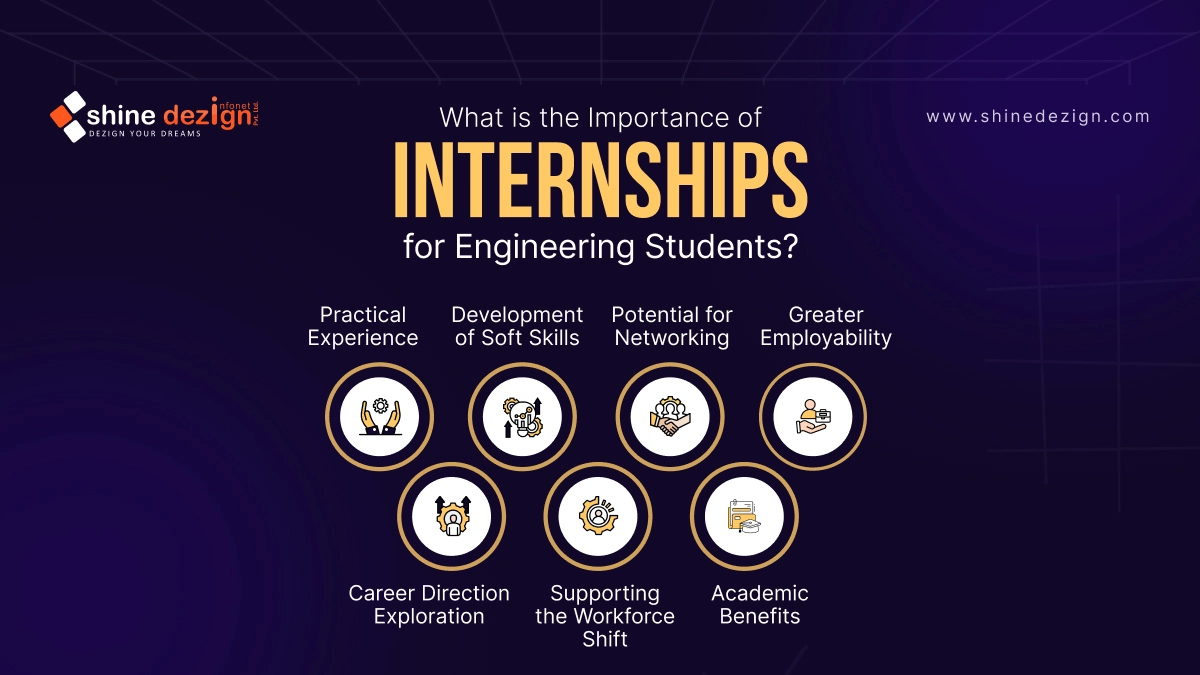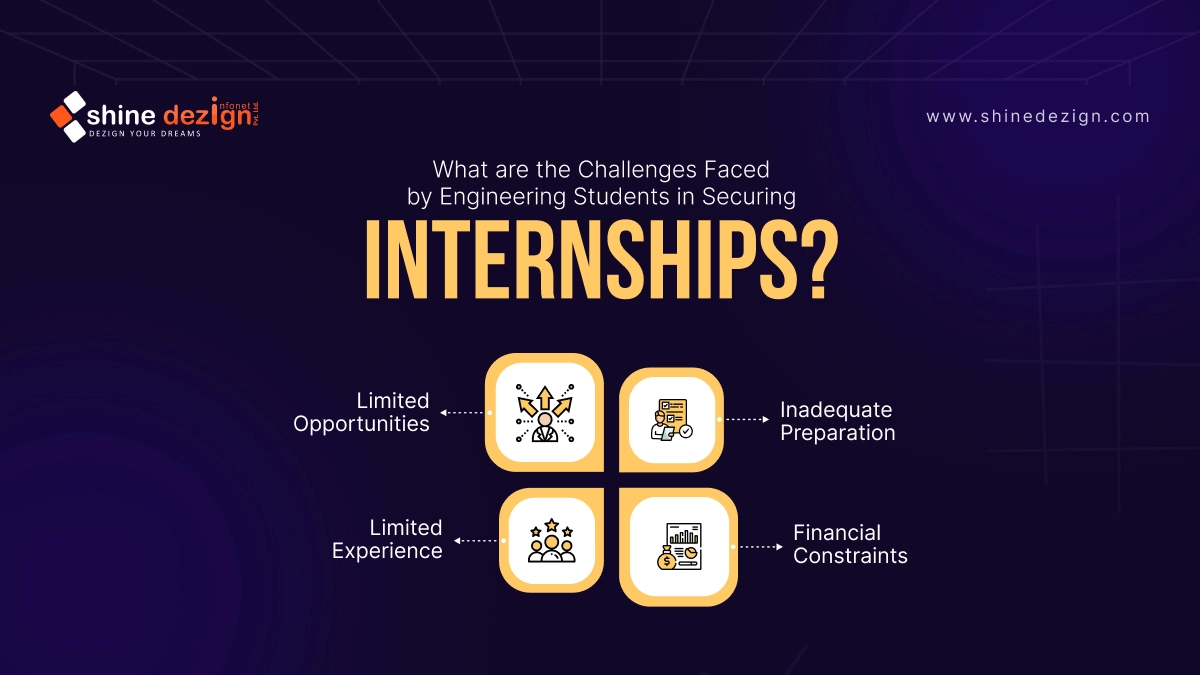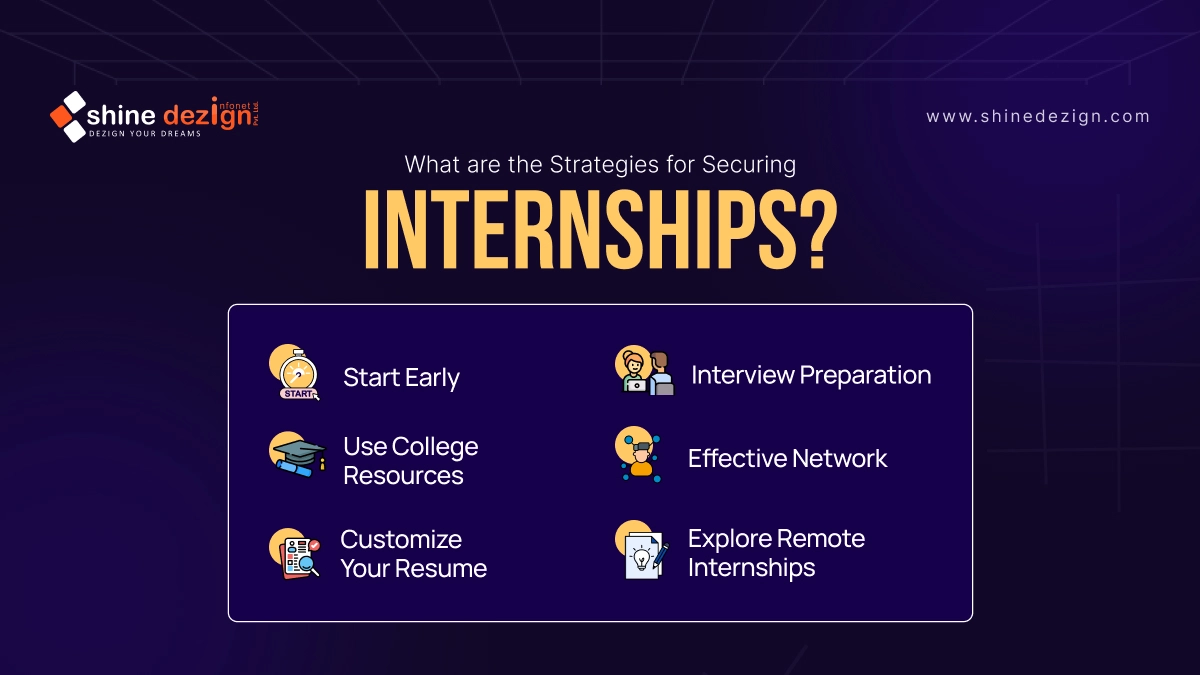Internships have become an inseparable part of the learning process for engineering students in India. With the job scenario getting more competitive by the day, the need to gain practical experience and industry exposure has never been more crucial. This blog discusses the significance of internships, their relevance, and how they shape the future of budding engineers.
What is an Internship in Engineering?
An engineering internship is a structured work experience that provides students with hands-on exposure in the field of study. Internships are commonly offered by companies, research institutions, or government agencies, and they provide students with an opportunity to work on real-world projects supervised by seasoned practitioners.
Key Features of Engineering Internships
Duration: Internships can vary from a minimum of 4 weeks to 12 weeks over summer break or as a semester program.
Types: Internships are categorized into several types:
- Paid Internships: Students receive a stipend or salary for their work.
- Unpaid Internships: Students work for no pay, typically instead of credit or experience.
- Full-time Internships: Students work full-time, typically during summer break.
- Part-time Internships: Interns work part-time and have academic responsibilities to attend to.
Learning Environment: Interns are integrated into teams to work on projects, interact with the team members, and brainstorm with the team.
Skill Development: Internships enable learning of new tools, technologies, and methodologies not covered in academic curricula, such as project management software, programming languages, and engineering design principles.
What is the Importance of Internships for Engineering Students?
Internships play a significant role in shaping the professional lives of engineering students. The following are some of the most significant reasons why they are crucial:

1. Practical Experience
Knowledge Application: Internships allow students to apply theoretical concepts learned in college to real-life scenarios. For instance, a mechanical engineering student may be asked to design a component for a machine using principles of mechanics and materials science.
Hands-on Skills: Hands-on training is delivered to the students using tools, software, and technologies in their field. For example, civil engineering interns would use AutoCAD for drawing, while computer engineering interns would utilize programming languages like Python or Java.
2. Development of Soft Skills
Communication: Internships improve the communication abilities of students, which are essential in working in collaboration and as teams for engineering projects. Communication is necessary to share ideas, argue project requirements, and provide feedback.
Time Management: Managing internship responsibilities alongside schoolwork helps students know how to manage time. This is a vital aspect in engineering since the timeliness of project deadlines is often not very negotiable.
Flexibility: An internship in a dynamic environment allows students to learn to adjust to new challenges and situations. Engineers often face unexpected situations that require flexibility and swift thinking.
3. Potential for Networking
Professional Connections: Internships provide a platform where students interact with professionals in their respective industries, which can translate to mentorship and potential employment opportunities. Networks with supervisors and colleagues can be beneficial for future professional growth.
Establishing a Professional Network: Relationships with peers and management would benefit career growth. Networking will lead to endorsements, references, and advice on potential job opportunities.
4. Greater Employability
Competitive Advantage: Employers prefer candidates with internship experience as it indicates initiative, hard work, and professional capability. A balanced resume with internships can distinguish candidates from their contemporaries.
Resume Building: Crafting a resume with all the necessary pinpoints can help to land good internships. Also, including internship experience can significantly enhance the attractiveness of a candidate to potential employers. It shows real expertise and a drive towards career growth.
5. Career Direction Exploration
Field Exposure: Through internships, students get to work in different engineering specializations, allowing them to make appropriate career decisions. For example, a student may discover a liking for renewable energy after interning at a solar energy company.
Discovery of Interests: Students acquire new interests or develop a passion from exposure during the internship, which decides the next level of studies and a career decision. This realization can lead to a fulfilling career.
6. Supporting the Workforce Shift
Understanding Corporate Culture: Internships provide a sense of what is required at work, corporate culture, and professional behavior, easing the transition from college to work. Understanding what is needed in a professional environment is essential for success.
Building Confidence: Completers of internship become more confident and prepared to take up full-time work responsibility at graduation. This confidence would lead to enhanced performance in interviews and placements.
7. Academic Benefits
Learning Reinforced: Internships will reinforce learning at the academic level as theoretical concepts will become meaningful. Students can see how their classwork applies to problems engineers encounter in practice.
Academic Credit: Most engineering degree programs offer credit for internships, allowing students to gain experience while fulfilling degree requirements.
What are the Challenges Faced by Engineering Students in Securing Internships?
Although internships are crucial, the majority of engineering students face difficulties when they get them. Understanding these challenges will equip students to prepare better and stay ahead of the internship game.

1. Limited Opportunities
Higher Competition: With increasing numbers of engineering students graduating each year, competition for internships is getting more difficult. It is not easy for the majority of students to secure employment in established companies.
Geographical Limitations: The geographical placement of some of these students may also restrict them as most of the top companies are based in large cities, and it gets difficult for rural or town-based students to gain access to these opportunities.
2. Limited Experience
Entry-Level Expectations: Some firms expect interns to have already experience, which hinders first-time applicants. This is a paradox where students need experience in order to secure an internship, but they can’t get experience without an internship.
3. Inadequate Preparation
Resume and Interview Skills: Lack of skills in writing a proper resume or performing well in an interview is common among students. This could outweigh their opportunities to secure an internship.
Networking Skills: Students may not know how to network well or leverage contacts when searching for internship opportunities.
4. Financial Constraints
Unpaid Internships: Most internships, especially in competitive industries, are unpaid. This is a significant barrier for students who must financially support themselves while gaining experience.
What are the Strategies for Securing Internships?
To succeed despite the challenges of getting internships, students can adopt several strategies:

1. Start Early: Begin Searching Early: Begin searching for internships early in your second year as an engineer. You will have ample time to search different fields and gain diversified experiences.
2. Use College Resources: Use Career Services: Use your college’s career services, job fairs, and alums networks to access internship opportunities. Most colleges have associations with companies providing internships exclusively for their students.
3. Customize Your Resume: Emphasize Relevant Experience: Customize your resume to accentuate related coursework, projects, and skills related to the internship job. Utilize action verbs and measure your accomplishments wherever possible.
4. Interview Preparation: Practice Interview Questions: Prepare frequent interview questions and be ready to discuss your academic work and related experience. Mock interviews can increase confidence.
5. Effective Network: Attend Networking Events: Join industry conferences, workshops, and networking events to interact with industry professionals. Building relationships can lead to internship offers.
6. Explore Remote Internships:: Search Remote Opportunities: Several businesses provide virtual internships due to the progress in remote work. This will make your doors even wider and allow you to look for companies all over the globe.
Conclusion
In short, internships are not just an added aspect of an engineering student’s course of study but an essential component that significantly influences their career. Through providing practical learning experience, enhancing skills, and building professional connections, internships prepare students for the realities of the engineering profession.
Internships must be a priority for students and colleges as an essential part of the engineering education process. With the evolving job market, the importance of internships will continue to rise, and therefore, internships are a necessity for future engineers in India.
Your questions, our answers
While not always mandatory, many engineering programs encourage or require internships to enhance practical learning and employability.
Internships usually last between 4 to 12 weeks, often during summer breaks or as part of a semester.
Internships can be both paid and unpaid. Paid internships offer stipends, while unpaid ones may provide academic credit or experience.
Internships provide practical experience, enhance soft skills, build professional networks, and improve employability.
Students can utilize college career services, attend job fairs, network with professionals, and search online job portals.
Recent Posts
- Top 10 Cities in India for Internship Opportunities
- Campus to Career Journey: The Role of Internships in Getting into Big Tech
- High Income Skills to Learn in 2026
- Web Developer Salary in India 2025: How Much Does a Developer Earn?
- Digital Marketing Salary Guide: Entry-Level to Expert Roles, Skills & Requirements













